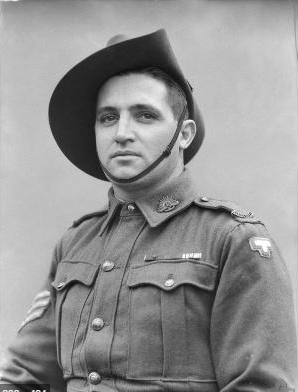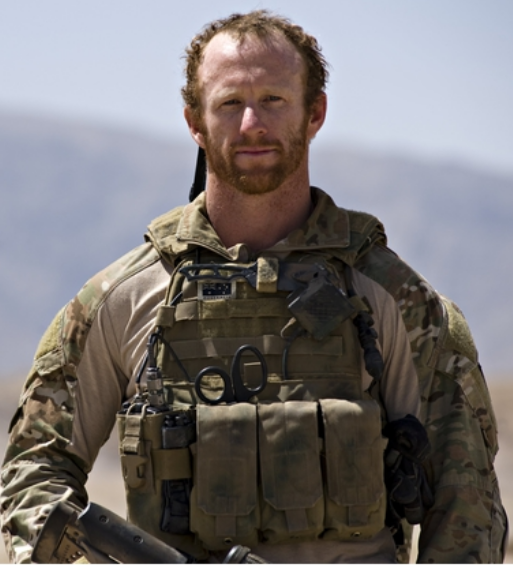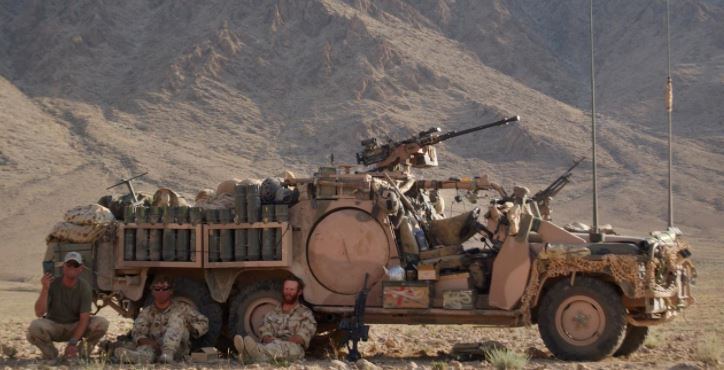Lieutenant Thomas Currie Derrick VC, DCM (1914 - 1945, 31yo)
 Tom Derrick was born on 20 March 1914 in the Adelaide suburb of Medindie, South Australia. Before his military career, he held a variety of jobs, including work at a vineyard in Winkie. He volunteered for the Australian Imperial Force on 26 June 1940 and officially enlisted on 5 July.
Tom Derrick was born on 20 March 1914 in the Adelaide suburb of Medindie, South Australia. Before his military career, he held a variety of jobs, including work at a vineyard in Winkie. He volunteered for the Australian Imperial Force on 26 June 1940 and officially enlisted on 5 July.
He embarked for the Middle East on 17 November 1940 with the 2nd/48th Battalion, a unit that would go on to earn the distinction of being the most decorated in the AIF. Even among such elite ranks, Derrick distinguished himself early. During the siege of Tobruk from April to October 1941, he undertook daring patrols against enemy positions, earning a promotion to Corporal. A Military Medal recommendation followed soon after, and a fellow officer described him as courageous, compassionate, and unwavering in his support for his men.
At Tel el Eisa in Egypt on 10–11 July 1942, Derrick charged through intense grenade fire, neutralised three machine-gun positions, and captured over 100 enemy troops. He then led the defence against a counter-attack, destroying two tanks with sticky grenades. These actions earned him the Distinguished Conduct Medal and a promotion to Sergeant by the end of that month. Later that year, at El Alamein, Derrick again demonstrated exceptional leadership, destroying three more enemy positions despite being slightly wounded. Those who witnessed his bravery believed it merited the Victoria Cross.
After returning to Australia in early 1943, Derrick trained in North Queensland and Papua before the battalion took part in the Lae campaign in September. On 24 November 1943, during the assault on Sattelberg in New Guinea, Derrick led his platoon up a nearly sheer jungle-covered slope under fire. Disregarding orders to pull back, he pressed forward, eliminating ten enemy positions with grenades and rifle fire. The climb was so steep it would be difficult even in peacetime, but by dusk, he had reached the edge of the summit. His extraordinary actions earned him the Victoria Cross, awarded on 22 March 1944. Ever modest, he credited the success to the support of his mates.
Returning to Australia again in February 1944, Derrick was selected for officer training and was commissioned as a Lieutenant in November. Unlike many others, he chose to return to his original battalion. On 1 May 1945, he landed at Tarakan in Borneo with the 2nd/48th. Later that month, on the night of 22–23 May, he led an assault on a heavily defended hill known as Freda. Though his performance might have justified a second Victoria Cross, the position remained contested. As he lay resting on a jungle track in the early hours of the morning, a burst of machine-gun fire struck him from hip to chest. With characteristic composure, he told a nearby soldier, "I've had it. That's that. Write to Beryl." He continued to give orders until the following morning.
Derrick succumbed to his wounds on 24 May 1945. He was buried in the Labuan War Cemetery in Malaysia (Plot 24, Row A, Grave 9). More than six decades later, in 2008, a major bridge over the Port River was named in his honour following a grassroots campaign supported by veterans and local media.
Corporal Mark Donaldson VC
 Mark Donaldson was born on 2 April 1979 in Newcastle, New South Wales. He joined the Australian Army on 18 June 2002 and began his military journey in the Royal Australian Infantry. In early 2004, he undertook and passed the demanding selection process for the Special Air Service Regiment (SASR), and by May that year, he was posted to 3 Squadron.
Mark Donaldson was born on 2 April 1979 in Newcastle, New South Wales. He joined the Australian Army on 18 June 2002 and began his military journey in the Royal Australian Infantry. In early 2004, he undertook and passed the demanding selection process for the Special Air Service Regiment (SASR), and by May that year, he was posted to 3 Squadron.
Donaldson earned the Victoria Cross for Australia for extraordinary bravery displayed on 2 September 2008 during a patrol mission in Afghanistan. While operating with Afghan and U.S. forces, the patrol was ambushed by a larger, well-prepared Taliban force. The attack involved sustained machine-gun and RPG fire, wounding several members of the team. In the thick of the ambush, Donaldson moved into the open under enemy fire to divert attention away from the wounded, providing crucial cover so they could be evacuated. As the patrol prepared to extract, it became clear that an Afghan interpreter had been left behind. Without pause, Donaldson sprinted roughly 80 metres across exposed ground, still under heavy fire, to retrieve the injured interpreter. He then carried him back to safety and administered medical aid. The engagement continued for two hours before the patrol broke contact.

After receiving the VC, Donaldson expressed his wish to remain operational within the SASR—a request approved by both the Chief of the Defence Force, Air Chief Marshal Angus Houston, and the Chief of Army, Lieutenant General Ken Gillespie. He returned to Afghanistan for further deployments in 2009, 2010, and 2013. In 2010, he was promoted to Corporal following completion of a junior leadership course.
Outside the military, Donaldson is married to Emma, and the couple has two children. Emma has described the intensity of his service by saying he was "married to the army." In 2013, he published his memoir, The Crossroad, detailing his life, service, and personal reflections. Despite the honours and public profile, Donaldson remains humble: "I don't see myself as a hero, honestly. I still see myself as a soldier first and foremost."
Last Reviewed 06/2025









